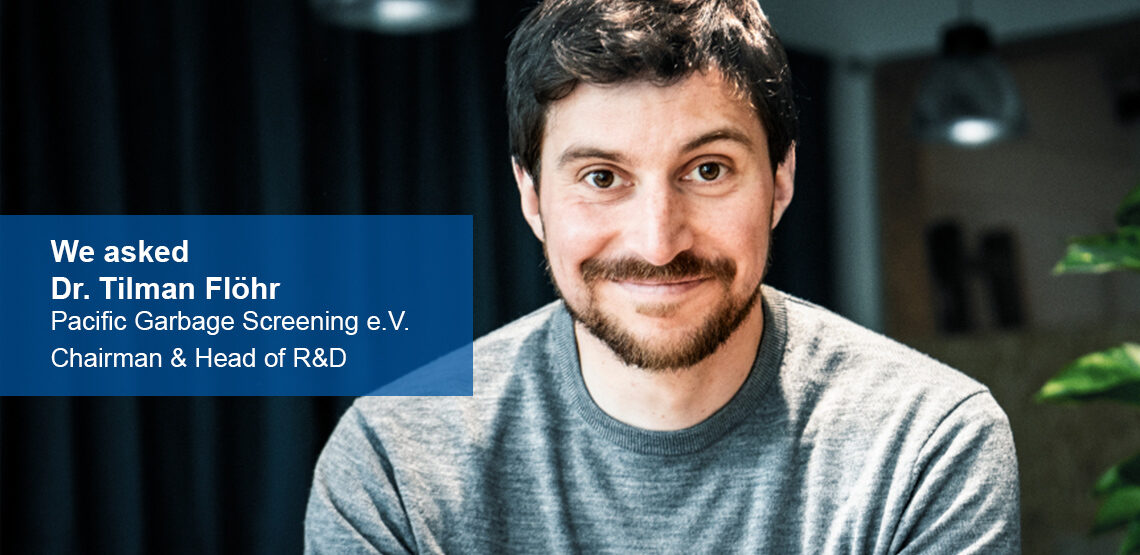24. September 2019
Pacific Garbage Screening e.V. is committed to plastic-free seas and waters. Using a combination of small platforms, plastic waste is to be intercepted in rivers so that it cannot get into the sea in the first place. The association used the Camp of the Innovation Factory in Karl-Friedrich-Street to develope the platforms. Dr. Tilman Flöhr reports about working in the camp and on RWTH Aachen Campus.
With Pacific Garbage Screening e.V. you have used the camp of the Innovation Factory for some weeks. What were you working on there?
For us, the camp was primarily about planning and building a primotype of our new platform system for rivers. During the first tests of our primotypes at the KFS, we were able to produce and combine small-scale modules. These were then tested by us on site under water for tightness and functionality. In the long term, we are pursuing the goal of collecting plastic from waters without the use of energy with our technology.
How did you use the resources of the camp premises?
In the camp we used the creative area to develope new ideas and their elaboration. This area is well equipped to visualize and discuss ideas, but also offers the possibility to think through ideas by retreating. Due to the high-quality technical equipment with the workbenches and machines, we were able to reproduce ideas quickly and check them for suitability in test scenarios. This agile approach allowed us to react very quickly during the conception phase. We were able to make small adjustments directly and thus constantly optimize the modules of the primotype.
What other institutions have you been able to benefit from in your work on RWTH Aachen Campus?
The access to the flow channel of the RWTH Institute of Hydraulic Engineering and Water Management was particularly helpful for us. After our first tests in water basins, working with the primotype in the large flow channel was an important, further step in which we were able to obtain relevant results. In addition, we also had access to the expertise of the versatile network. These include FIR e.V. at RWTH Aachen University, the Werkzeugmaschinenlabor at RWTH Aachen University, e.GO Mobile AG and the Werkzeugbau Akademie. The team of WZL and e.GO Mobile AG, for example, gave us practical insights into agile product development. Topics such as business model development using business model canvas and design thinking were taken up by us during our time in the camp through the exchange with the experts of the Innovation Factory. In addition, product design and functional prototypes were central topics during our time on RWTH Aachen campus.
What advantages do you see using the camp and the ecosystem RWTH Aachen Campus for your work?
During the project management workshops, we were able to define sprints with the experts on site and structure our work. This made us very agile and efficient. Probably the biggest advantage for our work in the camp were our central contacts, who had our needs and ideas as well as the versatile possibilities on the RWTH Aachen campus in mind and were able to adapt individually to us. The contacts were bundled in one contact person at the Innovation Factory and the necessary further expertise was obtained. We were able to learn a lot from the Innovation Factory team, the exchange was helpful: They questioned processes and ideas with an objective view and thus created space for new creative developments.
What are the next steps for you and your platforms?
After further tests of the current primotypes and the evaluation of the results, the planning and construction of the next primotypes follows, based on the knowledge gained. The different constructions for the concentration of the plastic will be tested on a larger scale. Using the agile approach learned in the Innovation Factory, we want to shorten the way to a prototype in order to be able to start the field tests in Europe and Asia as quickly as possible.
Further information on the work of Pacific Garbage Screening e.V. can be found on the PGS website.


